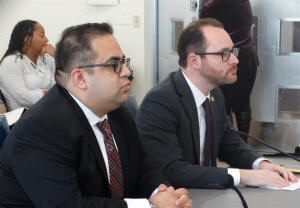Lawmakers work to meet Friday deadline
 Send a link to a friend
Send a link to a friend
[March 08, 2023]
By PETER HANCOCK
Capitol News Illinois
phancock@capitolnewsillinois.com
 SPRINGFIELD – Illinois lawmakers began working through mountains of
proposed legislation this week as a Friday deadline approaches for bills
to pass out of their original committees. SPRINGFIELD – Illinois lawmakers began working through mountains of
proposed legislation this week as a Friday deadline approaches for bills
to pass out of their original committees.
As of Tuesday, more than 6,500 bills had been introduced in the 2023
session. While many of those bills could miss that deadline, there are
multiple ways to work around regular deadlines to pass the substantive
language of a bill at a future date.
Below are a few of the bills discussed at the Capitol Tuesday.
Hotel industry
Hotel owners in Illinois said Tuesday they want state lawmakers to pass
legislation to protect their front-line workers from the increasingly
common threat of verbal abuse from their customers and guests.
That was one part of a legislative agenda that the Illinois Hotel and
Lodging Association unveiled as the industry continues efforts to
recover from the effects of the COVID-19 pandemic.
“Unfortunately, we have seen a troubling trend in which service industry
workers are facing abuse from customers,” association president and CEO
Michael Jacobson said during a news conference. “While this is not
unique to the hotel industry, it is important that hotels are able to
take necessary steps to keep employees safe and foster a positive
working environment.”

Several industries, including hotels, restaurants and airlines, have
reported a rise in customer harassment of their employees in recent
years. In Chicago, the problem became so bad that in 2018, the city
enacted an ordinance requiring hotels to issue panic buttons to hotel
housekeeping staff who are assigned to work alone.
The association said it wants legislation that would specifically
authorize hotels to remove guests or deny them accommodations when they
engage in harassing behavior. Jacobson said no such law exists in
Illinois today, which he said could put businesses in legal jeopardy if
they try to remove someone from their property.
The industry is also asking for relief from a relatively new and growing
form of competition – short-term property rental services such as Airbnb
and Guesty, which don’t have to charge and remit state bed taxes the way
hotels and motels do.
Jacobson said the industry wants the state to require businesses like
Airbnb to charge their guests the same 6 percent bed tax – officially
known as the Hotel Operators’ Occupation Tax – as hotels do. Revenue
from that tax is earmarked for several purposes primarily related to
convention and tourism promotion.

Election judges
As local election officials face a critical shortage of election judges,
state lawmakers are considering a bill that would offer incentives to
college students who agree to work at the polls on Election Day.
[to top of second column]
|

Lake County Clerk Anthony Vega, left,
and state Rep. Daniel Didech testify in the House Ethics and
Elections Committee about a bill calling on community colleges and
public universities to offer academic credit to students who
volunteer to work as election judges. (Capitol News Illinois photo
by Peter Hancock)

House Bill 995 passed unanimously out of the House Ethics and Elections
Committee Tuesday. It would require community colleges and public
universities to adopt policies for awarding academic credit for election
judges, although the bill’s sponsor, Rep. Daniel Didech, D-Buffalo
Grove, said it is written to give schools flexibility in what policies
they adopt.
Lake County Clerk Anthony Vega, who is supporting the bill, said it’s a
way to get more young people involved in the democratic process and
instill confidence in the integrity of elections.
“Inadequate staffing at the polls will result in a degrading voter
experience that may very well discourage voters from participating in
the process and play into the extremist movement which seeks to
undermine the integrity of our electoral process,” he said. “The bill is
not a golden solution. But it is an added tool for us to be able to
recruit and retain election judges across Illinois.”
Vega noted that Illinois already allows high school students to serve as
election judges to meet their civics requirement. But he said most other
election judges are either retired or professionals whose employers give
them the flexibility to take time off for an election.
Since 2020, Vega said, Lake County has operated with 25 to 40 percent
fewer election judges than it needs for optimal operation.
Voter registration
The House Ethics and Elections Committee also heard testimony to give
the Illinois secretary of state more authority to register voters.
In many other states, the secretary of state is the chief election
officer. But in Illinois, that job is assigned to the Illinois State
Board of Elections, and the secretary’s role is limited to offering
voter registration when people come in for a driver’s license or to
conduct other business with the office.

House Bill 3794, sponsored by Rep. Jennifer Gong-Gershowitz, D-Glenview,
would remove that restriction and allow secretary to offer voter
registration at any driver services facility or mobile site to any
qualified individual without having to perform any other services or
transactions. It would also allow the secretary of state to offer voter
registration applications through an online website maintained by that
office.
The bill provides that the secretary of state’s office would coordinate
with the State Board of Elections to attend citizen naturalization
ceremonies at each federal district court in Illinois to offer voter
registration services there as well.
The committee took no action on the bill. But Chairman Maurice West II,
D-Rockford, said it is one of several bills that could be folded into an
“omnibus” elections bill later in the session.
Capitol News Illinois is a nonprofit, nonpartisan news
service covering state government. It is distributed to more than 400
newspapers statewide, as well as hundreds of radio and TV stations. It
is funded primarily by the Illinois Press Foundation and the Robert R.
McCormick Foundation. |